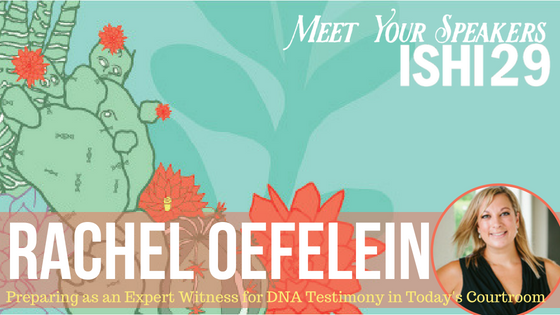Are you wondering how to explain probabilistic genotyping and likelihood ratios to a jury? Would you like to learn how to respond to forensic implications from media publications or landmark court decisions? Does the thought of learning and then describing new forensic technologies in a courtroom leave you anxious?
In her workshop at ISHI 29, Rachel Oefelein, Quality Assurance Manager and Senior DNA Analyst at DNA Labs International (DLI), will bring together a panel of experts who will show you practical ways to respond to specific questions received from prosecution and defense attorneys, in an open forum where you can ask the questions pertaining to your specific situation.
We recently interviewed Rachel, and she shared how she manages the stress of testifying, how probabilistic genotyping has changed the courtroom landscape, and one of her more unusual experiences as an expert witness.
Hi Rachel, first I’d like to thank you for chairing a workshop on expert witness testimony for the second year in a row! We had great feedback from your workshop last year, and I know attendees will leave feeling more prepared after this workshop as well.
You’ve testified in many different court rooms both in the US and internationally. Can you describe one of your more unusual experiences?
Testifying in courts based on a British system are always a bit different for me as I am used to most of my testimony occurring in the state of Florida. Every time I swear under oath to the queen I still can’t help smiling inside because it feels so historical. Also, many of the British courts require standing for testimony. Standing for hours in heels sometimes with no air conditioning in 90-degree heat can be a real challenge!
What’s one of the most common questions that witnesses receive from the prosecution or defense? How would you recommend a witness to answer the question?
Almost every trial I have has questions based on bias:
- So you are working for the prosecution so you must want the answer that serves the case they are building?
- Do you receive a bonus for every database hit you report?
- Did you only test evidence that would help the prosecution?
It’s important to remind the jury that you are on the side of the evidence, not the prosecution or the defense, and whichever side called you to appear in court that day in no way changes the results of your examination.
How has the prevalence of probabilistic genotyping software changed the way experts need to prepare for testimony?
Probabilistic genotyping allows for us to examine profiles that would have previously been deemed inconclusive. This means there is often far more results for many cases examined than there may previously have been prior to implementation of probabilistic genotyping software. The complexity of explaining probabilistic genotyping to a jury coupled with more items of evidence with statistics has led to much longer testimony. Experts need to prepare themselves for the possibility they could be on the stand for far longer than they have in the past. Additionally, with new technology comes admissibility hearings and questions we have never heard asked before so the expert needs to be prepared to think on their toes and make sure that they fully understand the science behind the results they are testifying to.
The average jury member probably doesn’t know much about statistics. How would you recommend explaining the concept of likelihood ratios to a lay person?
I am a huge fan of analogies, trying to explain the relevance or weight of a statistic to a lay person with no background in statistics can be a challenge. However, the average person will understand analogies like flipping a coin 10 times, the likelihood your breakfast included a poached egg and the hot and cold game! I will be explaining these analogies and other common analogies at the testimony workshop Thursday at ISHI.
I imagine testifying is quite intimidating. Do you have any tips on how to manage the stress?
For me, any nerves I experience are in the moments leading up to entering the court room. Once I make it to my seat without tripping I am good to go! In yoga there is an exercise called 4 corner breathing where you breathe in for four seconds, hold it for four seconds, exhale for four seconds and then count to four again before taking your next breath. If I am waiting in a hallway and find myself stressed this calms me right down. Also, you are far less likely to feel stressed if you are prepared. I review my case file and study before every testimony so I am refreshed on all of the details.
Who would benefit most from attending your workshop at ISHI? What can they expect to learn by attending?
Anyone involved in court proceedings or expecting to be involved in court proceedings can benefit from this workshop. Expert witnesses, students who plan to become forensic scientists and attorneys. This year our workshop will include an attorney as well as scientists, so we can address the good, bad and ugly of testifying from multiple angles. I will also take questions prior to the workshop from registrants so we can address topics that other scientists have experienced throughout the year.
Thank you for taking the time to chat with us Rachel. We can’t wait to see you in September! Reserve your seat in the workshop now – space is limited.
WOULD YOU LIKE TO SEE MORE ARTICLES LIKE THIS? SUBSCRIBE TO THE ISHI BLOG BELOW!


